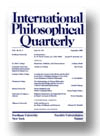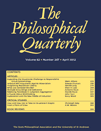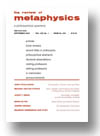
Filozofia Nauki
Scope & Guideline
Empowering Scholars Through Open Access Knowledge
Introduction
Aims and Scopes
- Philosophy of Science:
The journal emphasizes the philosophical underpinnings of scientific inquiry, exploring topics like scientific realism, the role of mathematics in science, and the impact of scientific theories on our understanding of reality. - Ethics and Axiology:
A significant focus is on ethical frameworks and value theory, including discussions on justice, moral obligations, and the philosophical implications of values in human decision-making. - Metaphysics and Ontology:
The journal publishes work related to metaphysical questions, such as the nature of time, existence, and the concept of universals, often drawing from historical philosophical movements like the Lvov-Warsaw School. - Experimental Philosophy:
There is a growing interest in experimental philosophy, which integrates empirical methods into philosophical research, examining intuitions, disagreements, and the cognitive processes behind philosophical reasoning. - Aesthetics:
The journal also engages with aesthetic theory, particularly in relation to taste, artistic value, and the philosophical implications of aesthetic experiences.
Trending and Emerging
- Integration of Experimental Methods:
Recent publications indicate a strong trend towards integrating experimental methods into philosophical inquiry, particularly in addressing questions of intuition, disagreement, and cognitive biases. - Interdisciplinary Approaches:
There is an increasing emphasis on interdisciplinary perspectives, particularly the intersections of philosophy with cognitive science, economics, and other fields, enriching the philosophical discourse with diverse methodologies. - Focus on Value Theory and Ethics:
A renewed focus on ethical implications of philosophical theories, particularly concerning personal and societal values, suggests an emerging interest in how philosophical insights can address contemporary moral dilemmas. - Contemporary Metaphysical Issues:
The journal is increasingly addressing contemporary metaphysical issues, such as discussions around presentism in time travel, reflecting a modern engagement with age-old metaphysical questions.
Declining or Waning
- Historical Philosophical Figures:
There seems to be a waning emphasis on historical figures and their specific doctrines, such as the detailed studies of individual philosophers from the Lvov-Warsaw School, which were more prominent in earlier volumes. - Traditional Logic:
Topics centered around traditional logic and its applications are appearing less frequently, indicating a possible shift towards more contemporary philosophical issues and methodologies. - Philosophy of Language:
While language remains a core element in philosophical discourse, discussions specifically focused on linguistic philosophy and its classical theories are declining in favor of more empirical and experimental approaches.
Similar Journals

ERKENNTNIS
Elevating standards of excellence in philosophical research.ERKENNTNIS, published by SPRINGER, is a premier academic journal that has been advancing the study of philosophy and logic since its inception in 1919. With its esteemed ranking in the Q1 quartile for both categories as of 2023, it stands at the forefront of scholarly discourse, earning an impressive rank of #104 in the field of philosophy and #13 in logic according to the Scopus rankings. This influential publication not only contributes to the theoretical underpinnings of these disciplines but also fosters a vibrant exchange of ideas among researchers, professionals, and students alike. While it does not offer open access to its articles, the journal's esteemed reputation and rigorous peer-review process ensure that all published works maintain the highest standards of quality and intellectual inquiry, making ERKENNTNIS an essential resource for anyone engaged in these critical areas of study.

JOURNAL OF VALUE INQUIRY
Elevating Discussions on the Nature of Values in SocietyJOURNAL OF VALUE INQUIRY, published by Springer, is a distinguished academic journal that has been a vital platform for the advancement of philosophical discourse since its inception in 1967. With an ISSN of 0022-5363 and an E-ISSN of 1573-0492, this journal focuses on the intricate intersection of philosophy, law, and social sciences, achieving impressive rankings in various categories with a Q1 designation in Philosophy and noteworthy placements in Law and Social Sciences as of 2023. The journal operates from Dordrecht, Netherlands, and serves as a vital resource for researchers, scholars, and students interested in ethical theories, the foundations of values, and their implications across diverse contexts. Though it is not an open-access journal, it maintains rigorous academic standards, embodying a commitment to contribute to the ongoing discussions in the philosophy of values. With its convergence extending to the horizon of 2024, JOURNAL OF VALUE INQUIRY continues to shape critical thought and foster scholarly dialogue within the realms of humanities and social sciences.

Filosofskii Zhurnal
Cultivating Insight in Philosophy and ScienceFilosofskii Zhurnal, published by the esteemed Russian Academy of Sciences - Institute of Philosophy, is a renowned academic journal focused on the vibrant fields of Philosophy, Cultural Studies, History and Philosophy of Science, and Linguistics. With an ISSN of 2072-0726 and an E-ISSN of 2658-4883, this esteemed publication has been a pivotal source of scholarly discourse since its inception in 2019, with converged years extending through 2024. Holding a distinguished Q2 quartile ranking in several disciplines, the journal is instrumental in advancing knowledge and research within its realms, making significant contributions to the understanding of philosophical thought, cultural dynamics, and language interpretation. Although it does not currently offer open access options, the journal maintains a strong presence in Scopus with notable rankings, including its position at #490/806 in Philosophy and #837/1304 in Cultural Studies. By providing a platform for original research, critical reviews, and interdisciplinary dialogue, Filosofskii Zhurnal serves as a valuable resource for researchers, professionals, and students seeking to deepen their understanding of philosophical inquiry and related fields.

Constructivist Foundations
Connecting Ideas, Inspiring Minds: The Constructivist JourneyConstructivist Foundations is a distinguished academic journal dedicated to exploring the intersection of constructivist theories and interdisciplinary applications. Established in 2010 and published by ALEXANDER RIEGLER in Belgium, this journal aims to provide researchers, educators, and professionals with a platform to disseminate innovative ideas about learning, cognition, and scientific philosophy. With a focus on artificial intelligence, cognitive neuroscience, education, and the history and philosophy of science, Constructivist Foundations has made strides in contributing to meaningful discussions within these Q2 and Q3 ranked fields. Although it currently holds a Q4 status in several areas, it plays a crucial role in fostering knowledge and dialogue among scholars, thereby enhancing the understanding of constructivist principles across various domains. With robust academic engagement and open access options, this journal continues to shape the future of educational and cognitive research.

Journal for General Philosophy of Science
Innovating Perspectives in the History and Philosophy of ScienceJournal for General Philosophy of Science, published by Springer, stands as a pivotal resource in the fields of History and Philosophy of Science, as well as general Philosophy. With an impressive Q1 ranking in its categories and a solid reputation reflected in its Scopus rankings, this journal provides a robust platform for scholarly discourse and advancement in philosophical inquiry regarding science. The journal's commitment to quality is evident, catering to researchers, professionals, and students interested in the critical examination of scientific methods, theories, and their implications. While it operates on a subscription basis, the journal is dedicated to fostering a deeper understanding of philosophical issues surrounding scientific practices from 1980 through 2024. Operating out of the picturesque Netherlands, specifically from VAN GODEWIJCKSTRAAT 30, 3311 GZ DORDRECHT, the journal continues to encourage innovative thinking and interdisciplinary dialogue, underscoring its significance in academia today.

INTERNATIONAL PHILOSOPHICAL QUARTERLY
Fostering Scholarly Exchange in PhilosophyINTERNATIONAL PHILOSOPHICAL QUARTERLY, published by the PHILOSOPHY DOCUMENTATION CENTER, stands as a vital resource for scholars and practitioners engaged in philosophical inquiry. With an ISSN of 0019-0365 and an E-ISSN of 2153-8077, this esteemed journal has published thought-provoking discussions and analyses in philosophy since its inception in 1974. The journal is housed in the United States at PO BOX 7147, CHARLOTTESVILLE, VA 22906-7147, and has shown a commitment to advancing philosophical debates across its converged years from 1974 to 2023. Recognized with a Q3 rating in the philosophy category for 2023, it ranks 511 out of 806 within Scopus, positioning it within the 36th percentile of its peers. Although not an open-access publication, it continues to offer critical insights that foster scholarly dialogue and research within the field. This journal is especially pertinent to researchers, professionals, and students who seek to deepen their understanding of contemporary philosophical issues and engage with a diverse array of philosophical perspectives.

REVUE INTERNATIONALE DE PHILOSOPHIE
Navigating the Complexities of ThoughtREVUE INTERNATIONALE DE PHILOSOPHIE, published by REVUE INT PHILOSOPHIE, is a prestigious journal in the field of philosophy, based in Belgium. With an ISSN of 0048-8143 and an E-ISSN of 2033-0138, this journal has been a vital platform for philosophical discourse since its inception in 1983, successfully evolving through various phases until 2024. Despite currently being positioned in the Q4 category of Philosophy according to the 2023 rankings, it serves as an important venue for scholars and students alike, allowing for a diverse exploration of philosophical thought. Although it is not an Open Access publication, the journal fosters a rich environment for rigorous scholarly research and debate. By presenting articles that challenge and inspire, REVUE INTERNATIONALE DE PHILOSOPHIE ensures that it remains an essential resource for anyone engaged in philosophical inquiry.

PHILOSOPHICAL QUARTERLY
Navigating the Landscape of Modern PhilosophyPHILOSOPHICAL QUARTERLY, a leading journal in the field of philosophy, is published by Oxford University Press, recognized for its commitment to advancing scholarly discourse since its inception in 1950. With an ISSN of 0031-8094 and an E-ISSN of 1467-9213, this prestigious journal is situated in the United Kingdom, reflecting a rich tradition of philosophical inquiry. The 2023 Category Quartiles rank it in the Q1 tier, demonstrating its substantial impact within the philosophy domain, supported by a Scopus rank of 130/806, placing it in the 83rd percentile of arts and humanities. While it does not currently offer open access, the journal remains a vital resource for researchers, professionals, and students seeking to engage with contemporary philosophical issues and theories. As it continues to publish insightful articles and critical discussions, the PHILOSOPHICAL QUARTERLY stands as a testament to the ongoing evolution and relevance of philosophical scholarship.

REVIEW OF METAPHYSICS
Advancing philosophical inquiry into the nature of reality.REVIEW OF METAPHYSICS is a distinguished journal published by PHILOSOPHY EDUCATION SOC, INC, dedicated to advancing scholarly discourse in the field of philosophy. With an ISSN of 0034-6632 and an E-ISSN of 2154-1302, this journal has been a crucial platform for philosophical inquiry since its inception in 1975, converging its rich content from 1992 and continuously serving the academic community up to 2022. Based in the United States, specifically at 223 Aquinas Hall, Catholic University America, Washington, DC, it has secured a reputation for quality, reflected in its placement within the Q3 category of the 2023 Philosophy rankings, and a Scopus rank of 367 out of 806 in Arts and Humanities, placing it in the 54th percentile. Although it does not offer open access options, the REVIEW OF METAPHYSICS remains an essential resource for philosophers and students alike, fostering critical perspectives on metaphysical issues, and thereby contributing significantly to the advancement of philosophical studies.

PHILOSOPHY OF SCIENCE
Navigating the Nexus of History, Philosophy, and SciencePHILOSOPHY OF SCIENCE, published by Cambridge University Press, serves as a premier journal at the intersection of history, philosophy, and science, making significant contributions to our understanding of scientific inquiry and its historical contexts. With an impressive impact factor reflected in its 2023 Category Quartiles—ranking Q1 in History, Q1 in History and Philosophy of Science, and Q1 in Philosophy—this journal stands out as a vital resource for researchers, professionals, and students alike. Operating without Open Access, it encourages the dissemination of groundbreaking ideas from 1949 through 2024, illustrated by its robust Scopus rankings, including a remarkable 98th percentile in the History category. Based in the United Kingdom at the prestigious Cambridge campus, PHILOSOPHY OF SCIENCE is committed to fostering scholarly dialogue and advancing critical thought in the philosophy of science.